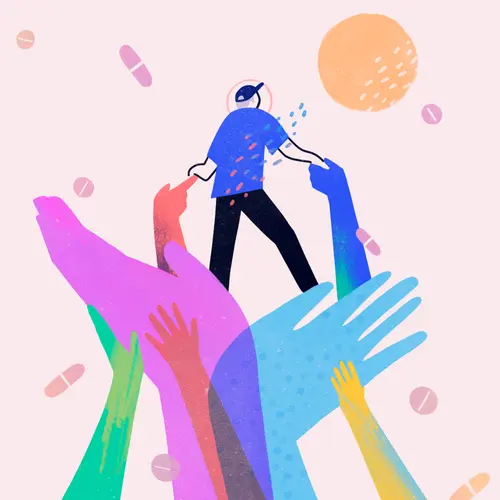Robert Casanta is a true believer in the power of mind-body therapies.
Even before he learned he had HIV in 1987, the 69-year-old from Revere, MA, used practices like meditation and self-hypnosis to feel better. After his diagnosis, techniques to relieve stress and pain became even more important.
He added many therapies to his routine, including massage and acupuncture. He felt good and had no symptoms for years.
But in late 1996, HIV caught up with him. Tests showed the virus was out of control and his immune system was shot. He was diagnosed with AIDS.
Months later, he started HIV medicine called antiretroviral therapy (ART), which he still takes today. It rebuilt his immune system and beat back the virus to untraceable levels.
ART saved Casanta’s life. But he says acupuncture, meditation, and other complementary therapies make living with HIV easier.
The Power of Complementary Therapy
Scientists estimate that more than half of people living with HIV use some sort of non-drug therapy to relieve symptoms of the virus, side effects from treatment, or to help improve their mood.
Gary Sinclair, MD, an HIV/AIDS specialist in Dallas, says the people he treats often use acupuncture, yoga, massage, and meditation.
These complementary therapies can relieve pain and other symptoms without drugs. That’s important, since some medicines you might take to treat those problems can keep HIV meds from working.
Another benefit: People who use mind-body therapies tend to keep taking their medication as they should, says Elizabeth Sommers, PhD, an acupuncture expert for people with HIV/AIDS at Boston Medical Center.
That’s important, too -- skipping even one dose can raise the chances that your medicine will lose its ability to keep the virus under control.
Acupuncture: Small Needles, Big Benefits
In this 3,000-year-old therapy, a practitioner places needles the size of a hair in specific spots on your body.
These points are like light switches, Sommers explains. When they’re turned on, they send messages to your brain, which then releases feel-good chemicals called endorphins.
In people with HIV, acupuncture can help with:
- Pain
- Trouble sleeping
- Depression, anxiety, and stress
- Irregular or painful menstrual periods
It can help with nausea, a side effect of HIV medication, Sinclair adds. That may make it easier to keep taking your meds.
Casanta is a huge fan of acupuncture. He uses it regularly for stress and arthritis pain. “I get needles all the time in my knees, and I always leave with a little bounce in my step,” he says.
If he misses an appointment, his body lets him know. It “actually craves those needles,” he says.
If you try acupuncture, go to a licensed acupuncturist. To find one in your area, go to the National Certification Commission for Acupuncture and Oriental Medicine’s website.
Meditation: Put Your Mind to Work
There are a few types of meditation, but most use deep breathing to quiet your mind and help you relax.
Mindfulness meditation may be especially stress-relieving for people with HIV. It teaches you to live in the present and not dwell on the past or worry about the future.
One study of stressed HIV-positive people showed that 8 weeks of mindfulness training can slow the disease. Researchers found that meditation seemed to protect important immune system cells from the damaging effects of stress and HIV.
Yoga: Strike a Pose
Yoga is a group of exercises that can ease stress and improve your fitness and flexibility.
It uses breathing exercises, poses and stretches, and meditation. You may feel more relaxed and calm afterward. It also can help with low back pain.
If you want to try yoga, find a trained practitioner and get the OK from your doctor before you start.
Massage Away Stress and Pain
A good rub-down by a trained massage therapist just feels good. It can ease muscle and back pain, headaches, and boost blood flow. There’s some evidence it can improve your immune system, too.
Ask your doctor for the names of good massage therapists in your area.
Other Things to Think About
Give it time to work. Don’t expect a complementary therapy to work magic after just one session. With acupuncture, for example, it may take several appointments before you start to notice a change, Casanta says.
Mix and match. Think about using more than one approach at once, such as combining massage with meditation.
Be careful about dietary supplements. Before you take one, ask your doctor if it’s OK. Some, like St. John’s wort, can lower levels of HIV medicine in your blood or cause other issues.
Your doctor can use a special computer program to flag a problem between the medicines you’re on and a supplement you want to try. “I frequently find them,” Sinclair says.
Be skeptical. Don’t buy into treatments that claim to be miracle potions that cure HIV/AIDS. The only thing that comes close to that is ART, which has turned HIV into a life-long, treatable condition in many people.
Go to the National Center for Complementary and Integrative Health website for reliable facts about different therapies and supplements.
Remember, complementary treatments are meant to work alongside your medical treatment -- not replace it.
Everything works together to create balance and good health, Sommers says.

